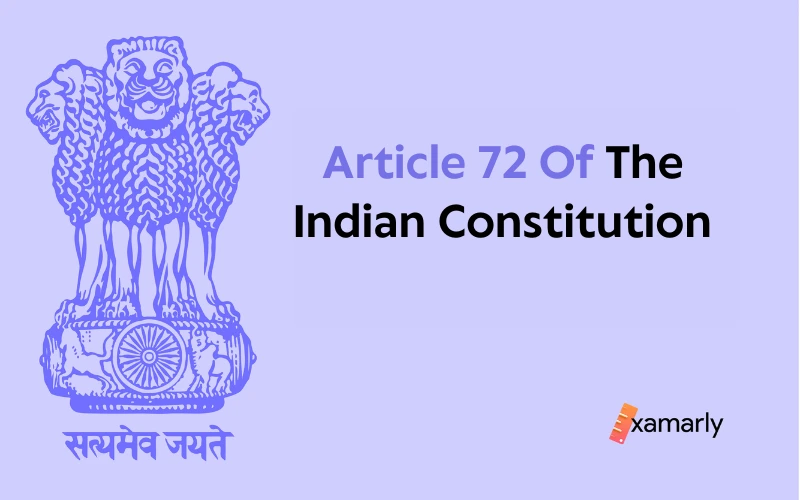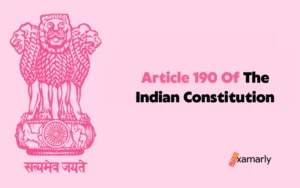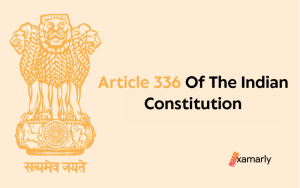The pardoning authority of the President of India is covered under Article 72 of the Indian Constitution.
It takes the shape of his pardoning powers when the President of India decides to intervene in the case of punishment or the sentence of any individual found guilty of an offense.
They come in five categories and these are commute, reprive, pardon, remit and respite.
An act of pity, forgiveness, or clemency is a pardon.
It has always been recognized that placing the power of pardon in a body other than the judiciary is vital since it exists to prevent injustice, whether from harsh, unjust laws or from verdicts that result in injustice.
The Pardoning Power Of The President, which is discussed in article 72, is included in the UPSC Indian Polity and Governance Syllabus.
Thus this article is worth reading.
- Legislative Background
- Article 72 Of The Indian Constitution: Constitutional Provisions
- Article 161
- Purpose Of Pardoning Power
- Nature Of Pardoning Power
- When Is The President Able To Exercise His Pardoning Authority?
- Types Of Pardoning Power
- Comparison Of Article 72 And Article 161
- Benefits Of The President's Pardoning Power
- Judicial Review
- When Are The Governor And President Permitted To Use Their Authority?
- What Function Does The Council Of Ministers Serve?
- What Steps Are Included In The Pardoning Process In India?
- What Is The Supreme Court's Opinion Of The President's Pardoning Authority?
- Revocation Pardon
- Pardoning Powers In Other Countries
- Conclusion
- FAQs
- What Is The Significance Of Article 72 In The Context Of The Indian Constitution?
- What Does Article 72 Of The Constitution Relate To?
- What Is The Meaning Of Pardoning Power?
- Does The President Of India Have Discretionary Power Under Article 72, Or Must He Follow The Counsel Of The Council Of Ministers?
- Why Does The Indian President Have Mercy-granting Authority?
- What Is The Need For Pardon?
- Is It Possible For Someone To Contest The President's Decision To Commute An Indian Death Sentence? Can The Supreme Court Take Up The Matter Again?
- What Is Article 74?
Legislative Background
Historically, the British monarch had the authority to grant pardons while they were in office.
An act of kindness through which the King released someone from any common law right, title, debt, obligation, or punishment was known as a pardon.
Section 295 of the Government of India Act, 1935, which took effect in 1935, contained the law of pardon and did not place any restrictions on the sovereign’s authority.
The Government of India Act, of 1935 did not contain a provision that corresponded to Article 161 of the Constitution.
In Article 72 of the Indian Constitution, the Presidential Pardon authority is outlined.
The President has the authority, according to Article 72, to grant pardons, respites, reprieves, or remissions of penalty, as well as to suspend, commute, or remit the sentence of anyone convicted of a crime.
In accordance with Article 161 of the Indian Constitution, the governor of a state has a comparable power.
Article 72 Of The Indian Constitution: Constitutional Provisions
- The President has the authority to commute sentences, postpone, give reprieves, or remit penalties to those who have been convicted of crimes—
- (a) in all situations where a Court Martial renders the punishment or sentence;
- (b) in all situations when the punishment or sentence is for a violation of any law pertaining to a subject under the Union’s executive power;
- (c) in all situations where a death sentence is imposed.
- Nothing in subclause (a) of paragraph (1) shall impair the authority granted by law to any officer of the Union’s Armed Forces to suspend, remit, or commute a Court Martial sentence.
- Nothing in subclause (c) of clause (1) shall impair the Governor of a State’s ability to suspend, remit, or commute a sentence of death exercisable under any currently in effect statute.
Article 161
According to Article 161 of the Constitution, a state’s governor also has the authority to pardon.
In light of this, the governor has the authority to commute sentences, suspend them, and grant pardons, reprieves, respites, and remissions of punishment to those found guilty of breaking state laws.
Check out the linked article to learn more about Article 161 of the Indian Constitution.
Purpose Of Pardoning Power
- In circumstances of wrongful conviction or where an innocent person would otherwise face punishment, a pardon could be of great assistance.
- The prospect of being pardoned in and of itself encourages the prisoner to act properly and contributes significantly to resolving the problem of prison discipline.
- Giving a criminal their liberty rather than punishing an innocent person is always preferable.
- The purpose of the pardoning power is to make up for potential judicial mistakes because no human-run system of judicial administration is faultless.
Nature Of Pardoning Power
Indian presidents are renowned for their lenient pardoning policies.
Forgiveness is an act of grace rather than a type of right that may be sought by anyone.
In contrast to the Constitutional provision, the executive branch as a whole, not just the President, is responsible for granting pardons.
This is carried out because the President must take action based on the suggestions and counsel of the Council of Ministers.
A pardon absolves the culprit of all blame altogether.
A full pardons to person renders him/her legally innocent, as though they had never conducted a crime. He has the persona of a new individual with new skills as a result of it.
The President has discretion when using his pardoning authority.
It has long been customary to provide some authorities the power to pardon.
Other nations, like the United States, also practice it.
In contrast to the UK, where the Crown has the same authority, the US Constitution grants the President the right to pardon.
When Is The President Able To Exercise His Pardoning Authority?
In the following situations, the President may exercise any of his or her pardoning powers:
- When he is deliberating on a matter of punishment for someone who violated a Union Law
- When he is reviewing a case in which the punishment was imposed by a court-martial or military court
- When he is debating a death penalty
While granting a pardon, the President is not free to do as he pleases. Before making any decisions, he must seek the advice of the Home Minister and the Council of Ministers.
As per Article 74 of the Constitution, the President is required to follow the ministers’ recommendations.
Types Of Pardoning Power
- Pardon: When the President commutes a convict’s sentence or conviction, all sentences, punishments, and disqualifications are completely wiped away. After receiving a pardon, it seems that the individual had no prior convictions, and he is now free to function in society.
- Reprieve: When the President exercises his pardoning authority to “Reprieve,” he halts the execution of a punishment for a temporary period, notably a death sentence. He gives the prisoner enough time to ask him for a pardon or commutation by doing this.
- Commute: When the President decides to exercise his pardoning authority under the “Commute,” he switches one form of punishment for a less severe one. For instance, a death sentence could be changed to rigorous imprisonment and then to simple imprisonment.
- Respite: When the President exercises the pardoning authority of “Respite,” he decides to substitute a lesser sentence or lighter form for the one that would have been imposed on the offender originally. For instance, the President may exercise this authority due to a unique circumstance, such as a prisoner’s physical disability or a woman offender’s pregnancy.
- Remit: When the President uses the pardoning option of Remit, he shortens the sentence’s duration while maintaining its overall meaning. For instance, a sentence of strict incarceration for 3 years may be reduced to strict incarceration for one year, but the incarceration is still strict.
Comparison Of Article 72 And Article 161
| Article 72 | Article 161 |
| This article grants the pardoning power to the President of India. | This article grants the pardoning power powers to the Governor of state. |
| The sphere of power is broader. | The sphere of authority is less. |
| Court Martial cases are included in the scope of the pardoning authority. | Courts Martial are beyond the reach of power. |
| Allows the President to grant a pardon in circumstances of the death penalty. | In situations where someone has been sentenced to death, the governor cannot give a pardon. On the contrary, the governor has the authority to suspend, remit, or commute a death sentence. |
Note: The governor and the president have concurrent jurisdiction when it comes to the suspension, remission, and commuted sentences of death.
Benefits Of The President’s Pardoning Power
The ability of the president to pardon was enshrined in the Constitution as a protection against judicial rulings that would subsequently be found to be too harsh.
Pardoning the President’s authority has a number of benefits, such as:
- If justice was not adequately administered to the offender, they may be spared from penalty.
- The judicial process allows for the correction of errors or inconsistencies.
- If the President deems the punishment to be excessively harsh, postpone the punishment.
Judicial Review
Judicial review refers to the court’s authority to examine how the executive and legislative branches of government operate.
The court has the authority to review the President’s pardoning decisions to ensure that they are not irrational, arbitrary, or unjust.
This was briefly covered in the Maru Ram v. Union of India case (1980).
In Mansukhlal Vithaldas Chauhan v. State of Gujarat (1997), the Supreme Court ruled that courts lack the authority to overturn administrative judgments.
The decision-making process is simply reviewed. The scope of judicial review is extremely constrained.
One cannot request the President to give the reasoning behind a decision. The President shouldn’t go beyond his or her legal bounds in using his or her power.
When Are The Governor And President Permitted To Use Their Authority?
The courts have come to the following opinions regarding the stages at which the various pardoning powers under the Constitution may be exercised:
- Any time after the crime was committed, whether before or after conviction, a pardon may be awarded.
- During the time that an appeal is pending before a higher court, a pardon may be given.
- During the time a Supreme Court appeal is pending, a sentence cannot be suspended.
What Function Does The Council Of Ministers Serve?
The President of India is given the authority to grant pardons under Article 72 of the Indian Constitution, but he is not free to do so at his discretion and must follow the advice of the Home Minister and the council of ministers.
The President, subject to the terms of Article 74(1), must act in line with the recommendation given by the executive branch to him or her in order to exercise the power of pardon and save an innocent person from punishment.
What Steps Are Included In The Pardoning Process In India?
According to the provisions of Article 72 of the Constitution, the procedure begins with the submission of a mercy petition to the President.
The Ministry of Home Affairs in the Central Government is then notified of such a petition for review.
The Home Ministry discusses the aforementioned petition with the relevant State Government in collaboration.
The Home Minister makes recommendations following the consultation, and the petition is then forwarded back to the President.
What Is The Supreme Court’s Opinion Of The President’s Pardoning Authority?
According to the ruling in Kehar Singh v. Union of India, the President is allowed by the Constitution to review the evidence in a criminal case record and come to a different conclusion than the court, but doing so does not change, modify, or supersede the court record.
Under the famed Ranga-Billa Case, Kuljeet Singh v. Lt. Governor, the court ruled that the President has the power to commute any sentence handed down by a court to a shorter one in acceptable circumstances.
The belief that holding a man behind bars for longer than is required is often upheld by the courts. This is because it is not only bad for the individual but also costly and detrimental to society as a whole.
The Supreme Court and High Courts have the option of a limited judicial review of the use of the clemency powers, according to a well-established concept in the Epuru Sudhakar case.
The following reasons can be used to challenge the President’s or Governor’s clemency decision:
- The order has been passed without application of mind.
- The order is mala fide.
- The order has been passed on extraneous or wholly irrelevant considerations.
- Relevant material has been kept out of consideration.
Revocation Pardon
The possibility of the executive’s pardon being withdrawn or rescinded is very real.
There are two situations in which the executive may be informed about the revocation.
A pardon can first be revoked if it was obtained through deceit, deception, or misinformation.
To put it another way, a pardon that was acquired through dishonest and fraudulent representation or willful suppression of the truth is illegal, regardless of whether the individual who was pardoned was complicit in the fraud.
Either the person asking the pardon or the person seeking the pardon may receive one.
A pardon can really be granted unconditionally or under certain conditions.
The condition must be continuously satisfied; else, the prisoner risked being sent behind bars.
Pardoning Powers In Other Countries
Like the Indian Constitution grants pardoning power to President, other countries also grant such mercy powers to shield the innocent ones from punishment.
British: The contemporary custom of pardoning has its roots in the British legal system when the King had the only right to do so.
On the recommendation of the ministers, the Constitutional monarch in the UK has the power to pardon or show mercy for a conviction.
USA: The President may pardon or grant reprieves for crimes against the United States under the American Constitution, barring cases of impeachment.
However, this authority is only accessible when a Federal law has been broken, and the Governor of the State in question must grant a pardon when a State law has been broken.
Canada: The Criminal Records Act allows the National Parole Board to consider pardons.
Conclusion
The President has the constitutional authority to pardon someone, but this mercy power authority must be used carefully.
The courts have the authority to review this power.
Under exceptional circumstances, such as when the President believes the court erred in rendering its decision, the pardoning power may be used.
Upon appropriate consultation with and guidance from the Council of Ministers, the President will consider applications for compassion.
The President is not permitted to use this pardoning authority in accordance with his own preferences or inclinations.
Check out the linked articles to know about other articles which will help you to give your preparation of Indian Polity an edge regarding the constitution of India.
FAQs
What Is The Significance Of Article 72 In The Context Of The Indian Constitution?
Article 72 is significant because it gives the Indian population a peek at the president of India’s authority. It holds the most important position in the Indian Constitution.
What Does Article 72 Of The Constitution Relate To?
Having a pardoning power in India is a part of the Constitution. The President is granted the authority to commute, pardon, and remit sentences of criminals. Moreover, he has the authority to issue respite orders and suspend punishments. This constitutional power is enshrined in article 72.
What Is The Meaning Of Pardoning Power?
A pardon is an executive action that absolves the person who is the subject of it from punishment and this power is exercised by an executive authority to shield innocent individuals from punishment.
Does The President Of India Have Discretionary Power Under Article 72, Or Must He Follow The Counsel Of The Council Of Ministers?
The President is not able to use his authority of pardoning in the way he wants. The Council of Ministers’ recommendations to him must be taken into consideration. If the President is unsatisfied with the Union ministers’ proposals, he can send the file back to the ministry for revision. The ministry will then offer the President its recommendations once more.
Why Does The Indian President Have Mercy-granting Authority?
Because he serves as the Union’s executive head and is not involved in the judicial system, the President is regarded as having higher authority.
The Indian Constitution has given him the power of mercy and the authority to grant pardons since he is capable of making impartial choices based on the socioeconomic circumstances of the accused.
What Is The Need For Pardon?
A person may be awarded a pardon if it is determined that they have paid their obligation to society or are otherwise regarded deserving of one. People who were either unfairly convicted or who believe they were wrongfully convicted are occasionally awarded pardons. Sometimes people think of pardons as a way to fight corruption by getting around an unfair legal system and releasing someone who they believe was wrongfully condemned.
Is It Possible For Someone To Contest The President’s Decision To Commute An Indian Death Sentence? Can The Supreme Court Take Up The Matter Again?
Although the President’s judgment cannot be contested, his or her pardoning authority is open to judicial review. The President is not obligated to explain the reasons behind his decision. If it is determined that the President acted arbitrarily or inappropriately in using his pardoning authority, the matter may be revived before the Supreme Court.
What Is Article 74?
In accordance with Article 74 of the Indian Constitution, the President would have the assistance of a Council of Ministers as they carry out their duties.






